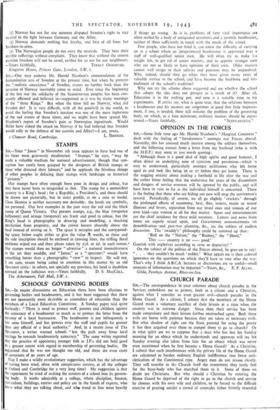SCHOOLS' - GOVERNING BODIES Sit,—In recent discussions on Education there have
been allusions to governing, bodies and headmasters, and it has been suggested that these are not necessarily more desirable as controllers of educatiOn than the members of Local Education Committee. A Sunday paper said quite fearlessly : "There is need to protect staff, parents and children against the autocracy of a headmaster as much as to protect the latter from the tyranny of a local bureaucrat. The headmaster is not infrequently a law unto himself, 'and has powers over the staff and pupils far greater than any official of a local authority." And, in a recent issue of The Spectator, a writer warned schools "lest the path away from local tutelage be towards headmasterly autocracy." The same writer regretted that the practice of appointing younger folk as J.P.s did not hold good to a greater extent with regard to membership of governing bodies. He suggested that 8o- was not thought too old, and there are even cases of governors of 90 years of age.
May I make a wildly revolutionary suggestion, which has the advantage of having been tried, often with conspicuous success, at all the colleges it Oxford and Cambridge for a very long time? My suggestion is that the experiment be tried of making the masters of a school into its govern- ing body. It works admirably at a college, where discipline, finance, curriculum, buildings, entries and policy are in the hands of experts, who- know what they are talking about, and who Stand to lose most heavily if things go wrong. As it is, problems of very vital importance are often settled by a body of antiquated governors and a juvenile headmaster, neither of them sufficiently in touch with the needs of the school.
Few people, who have not tried it, can know the difficulty of carrying on at a school where an :nexperienced headmaster is appointed over a staff of well-qualified senior men. He will often try to make his weight felt, to get rid of senior masters, and to appoint younger men who are not so likely to have opinions of their own. Older masters cannot well resign or their salaries and pensions may be jeopardised. Why, indeed, should they go when they have given many years of valuable service to the school, and have become the backbone and em- bodiment of the school's tradition?
Why not try the scheme above suggested and see whether the school that adopts the idea does not prosper as a result of it? After all, Education is in the melting pot, and now is a suitable time to try experiments. If critics say, what is quite true, that the relations between a headmaster and his masters are sometimes so good that little improve- ment, if any, is needed, there still remains the pioblem of the governing body, on which, as a bare minimum, ordinary masters should be repre-


























 Previous page
Previous page